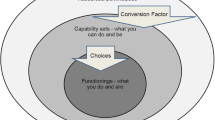Abstract
Amartya Sen’s capability approach has recently been widely discussed as a theoretical basis for making resource allocation decisions in health care. The purpose of this paper is to analyze the relationship between capabilities and functionings in the capability approach. The paper shows that some functionings are not only the result of capabilities, but also their prerequisite. That is, there is a dual role of some functionings as both ends and instruments, resulting in a mutual dependency between capabilities and functionings. Functionings may be a direct requirement for capabilities, but also an indirect one because they ensure the absence of mental disorders or negative thoughts, both of which are relevant constraints on freedom. This has important implications. It supports a policy that ensures for everyone an initial endowment of (1) mental and physical health, (2) education, and (3) other functionings with a direct or indirect impact on capabilities.
Similar content being viewed by others
References
Chaudhuri B, Reboud V (2003) On the implicit conceptions of freedom and justice involved in the capability approach. Third conference on the capability approach: from sustainable development to sustainable freedom. 7th–9th September 2003. University of Pavia, Pavia (Italy)
Diener E and Seligman MEP (2004). Beyond money: toward an economy of well-being. PSPI 5: 1–31
Donovan N, Halpern D, Sargeant R (2002) Life satisfaction: the state of knowledge and implications for government. The Prime Minister’s Strategy Unit, Cabinet Office, London
Drèze J and Sen A (1995). Indian development: selected regional perspective. Oxford University Press, Oxford
Eaves G and Rush AJ (1984). Cognitive patterns in symptomatic and remitted unipolar major depression. J Abnorm Psychol 93(1): 31–40
Forgas JP, Williams K and von Hippel W (2004). Social motivation. Cambridge University Press, New York
Haybron DM (2001). Happiness and pleasure. Philos Phenomenol Res 62(3): 501–528
Kown SM and Oei TPS (1994). The roles of two levels of cognitions in the development, maintenance and treatment of depression. Clin Psychol Rev 14: 331–358
Krantz S and Hammen C (1979). Assessment of cognitive bias in depression. J Abnorm Psychol 88(6): 611–619
Lewinsohn PM, Steinmetz JL, Larson DW and Franklin J (1981). Depression-related cognitions: antecedent or consequence?. J Abnorm Psychol 90(3): 213–219
McDermut JF, Haaga AAF and Bilek LA (1997). Cognitive bias and irrational beliefs in major depression and dysphoria. Cogn Ther Res 21: 459–476
Nelson RE (1977). Irrational beliefs in depression. J Consult Clin Psychol 45(6): 1190–1191
Robeyns I (2000) An unworkable idea or a promising alternative? Sen’s capability approach re-examined. Discussion paper 00.30. Center for Economic Studies, University of Leuven, Leuven
Rose DT, Abramson LY, Hodulik CJ, Halberstadt L and Leff G (1994). Heterogeneity of cognitive style among depressed inpatients. J Abnorm Psychol 103(3): 419–429
Sen AK (1985). Well-being and freedom. J Philos 82: 185–221
Sen AK (1985). Commodities and capabilities. North Holland, Amsterdam
Sen AK (1987). On ethics and economics. Basil Blackwell, Oxford
Sen AK (1992). Inequality reexamined. Clarendon Press, Oxford
Sen AK (1996). On the foundations of welfare economics: utility, capability and practical reason. In: Farina, F, Hahn, F, and Vannucci, S (eds) Ethics, rationality, and economic behaviour, pp. Clarendon Press, Oxford
Sen AK (1999). Development as freedom. Oxford University Press, Oxford
Sen AK (2002). Why health equity?. Health Econ 11(8): 659–666
World Health Organization (1992) ICD-10 International statistical classification of diseases and related health problems. World Health Organization, Geneva
Author information
Authors and Affiliations
Corresponding author
Rights and permissions
About this article
Cite this article
Gandjour, A. Mutual dependency between capabilities and functionings in Amartya Sen’s capability approach. Soc Choice Welfare 31, 345–350 (2008). https://doi.org/10.1007/s00355-007-0283-7
Received:
Accepted:
Published:
Issue Date:
DOI: https://doi.org/10.1007/s00355-007-0283-7




